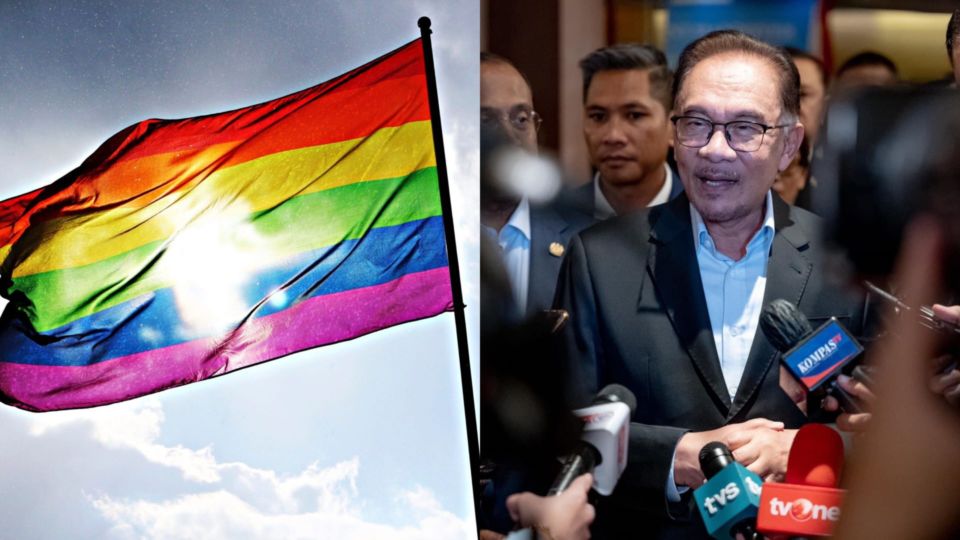This op/ed was written by Thilaga Sulathireh, co-founder of Justice for Sisters, a grassroots campaign that aims to raise public awareness about issues surrounding violence and persecution against the Mak Nyah (trans women) community in Malaysia.
Anwar Ibrahim’s statement that liberalism, LGBT and secularism will never be recognised by the unity government has to be unpacked in a nuanced way. The statement was made during an interview with Radio Television Malaysia (RTM) in its ‘Naratif Khas Bersama Perdana Menteri’ on 6 January 2022.
Firstly, it is important to recognize that Anwar Ibrahim is a Malay Muslim man who has continued to be plagued by multiple charges under Section 377A and B, in a context where conservatism and sentiments against LGBT people and liberalism are escalating to alarming heights. Malay Muslim persons generally find it challenging to publicly voice their support for LGBT people in the context of Malaysia; those who do face severe backlash.
Regardless of whether the charges against Anwar were politically motivated, Section 377A and B is in violation of international human rights law, rule of law and, most importantly, the rights safeguarded under the Federal Constitution, especially the right to equality and non-discrimination, privacy, and right to live with dignity.
In the interview, Anwar said both he and Pakatan Harapan were closely linked to communism, liberalism and LGBT people or issues in the recent GE15. PAS claimed that Anwar and Pakatan Harapan would legalise ‘same-sex marriage’. An old interview with Anwar Ibrahim on Section 377 A and B was used as a propaganda tool to discredit him and fed the rise of, among other things, increasing LGBTphobia and panic surrounding the repeal of Section 377A and B should Pakatan Harapan come into power. Pejuang (the Homeland Fighter’s Party) via Twitter called for Anwar Ibrahim to denounce LGBT people.
Such anti-LGBT sentiments, coupled with scapegoating for political expediency and survival, are dangerous. It has effectively increased LGBT-related misinformation and bias. Other than Anwar, a number of politicians, especially from Pakatan Harapan, were also labelled as ‘pro-LGBT’. Some have suffered severe political costs, namely loss of seats and support from their constituents and party members alike.
In this context, some politicians can feel cornered and pressured to distance themselves from anything that could be interpreted as them being ‘pro-LGBT’. Politicians who lack evidence- and rights-based lenses to inform policymaking end up taking defensive and problematic positions that have harmful effects on LGBTQ and gender-diverse people, and society as a whole.
This is what we have seen in the past—for example, Anwar Ibrahim saying in 2018 that people should oppose LGBT people and ‘super liberals’—and are currently observing from Pakatan Harapan politicians. Their strategy is to preemptively and aggressively disassociate themselves from LGBTQ issues and claims that they are ‘pro-LGBT.’ Case in point, Pakatan Harapan mounted several legal challenges against PAS for claiming that they are ‘pro-LGBT.’
Unfortunately, these short-sighted and reactionary positions and strategies do not address the root issues of prejudice and discrimination against LGBTQ people and, in fact, exacerbate the exclusion of and intolerance towards LGBTQ persons in Malaysia. The conflation of LGBTphobia and liberalism also has repercussions on other human rights defenders and rights groups that tackle other human rights violations, contributing to a shrinking civic space.
A Justice for Sisters’ survey with 220 LGBTQ and gender-diverse people shows that 124 respondents (56.4%) stated that anti-LGBT statements by politicians caused them increased stress. 33.6% said that they experienced discrimination, and only 22 respondents (10%) said that they experienced no impact.
LGBTphobia in Malaysia is increasing at an alarming state. The Centre for Independent Journalism’s GE15 monitoring shows offensive posts relating to gender and LGBT were 3 times higher than race- and religion-related offensive posts, and 8 times higher than royalty-related or discriminatory posts.
In this context of rising discrimination, access to justice remains low. In the same survey by Justice for Sisters, at least 59% of 220 respondents were uncomfortable with reporting cases of discrimination and violence to government agencies. 39% said that they have thought of migrating or seeking asylum because of the increasingly hostile environment in Malaysia. These findings demonstrate a high level of trust deficit in the government.
As Anwar Ibrahim has repeatedly mentioned, he is not just the PM for those who voted for him or participated in the election, but he also represents the interests of all and diverse people, including people of various ethnicities, religions, geographical backgrounds, sexual orientations and gender identities. As he mentioned as well, it is important for him and state agencies and actors to be evidence-based in implementing policies, rather than contribute to the discrimination of LGBTQ persons.
Anwar’s statement was widely reported in many media outlets in Malaysia, and also in Indonesia, where anti-LGBT sentiments are also high.This raises concerns over the continuation of discrimination with impunity against LGBT people around the region.
As the head of state, Anwar Ibrahim must show leadership and innovation in addressing the weaponisation of anti-LGBT and anti-liberal sentiments, and its impact on already marginalised groups, including LGBT people, human rights defenders, and progressive Muslims. It is important to note that by failing to address these issues tactfully and effectively, and appeasing only the most vocal conservatives, Anwar Ibrahim may continue to marginalise these populations.
We recommend that Anwar Ibrahim and his administration adopt democratic processes by engaging civil society in addressing the weaponisation of anti-LGBT and anti-liberal sentiments to break the stranglehold that anti-rights actors have in determining and controlling the narrative within the political landscape.




